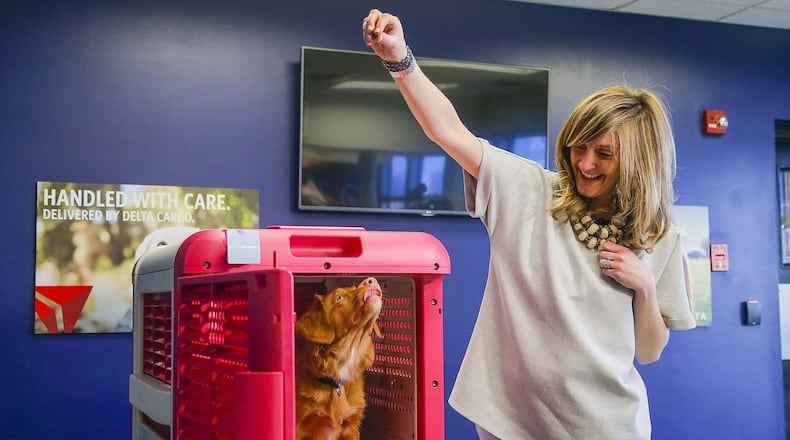Delta Air Lines is introducing an upscale alternative for four-legged travelers: a pet carrier with GPS tracking, built-in water bowl and triple-locking door.
At $850 one way, the elaborate new crate for the cargo hold isn’t cheap. But it does come with industrial-strength walls and “specially angled blinds to help create a calming environment for pets,” the Atlanta-based airline announced Wednesday.
The launch of the CarePod follows Delta's decision in 2016 to stop accepting pets as checked baggage, after facing criticism for pet deaths in checked carriers.
It also comes as the era of emotional support animals and exotic service animals in flight cabins might come to an end — potentially removing one popular option to travel with a pet for free.
That's because the U.S. Department of Transportation unveiled a proposal Wednesday to stop recognizing emotional support animals as service animals and to recognize only dogs as service animals.
The agency is inviting public comment for 60 days before it decides on the final rules, which could take months or years to finalize.
As more passengers try to fly with pets, the rules have grown more complicated, with airlines trying to balance safety with demand — while also making a buck.
More or less friendly skies for pets and their owners?
Delta continues to let animals that aren't emotional support or service animals fly in the cabin for about $125 each way— but the animal must be small enough to fit in a carrier under the seat.
Larger pets can continue to be transported as cargo on Delta. But even in the cargo hold, Delta last year put in place restrictions on pet carrier size to allow crates only up to 24 inches high.
Transporting a pet from Los Angeles to New York using regular Delta cargo service can cost $244 to $656, depending on size and add-ons like use of a crate and GPS.
The CarePod is also roughly two feet high — large enough for a dog up to about 50 lbs. It’s designed to reduce vibrations, noise and visual stimulation while pets travel. Dog owners can bring their dog in on a leash instead of providing their own carrier, and can get updates on their pet’s journey on their mobile phones.
The goal “is to make pet travel as safe or safer than human travel,” said Matt Weisenburg, Delta director of safety and alliances.
In addition to Atlanta, the CarePod is now available in Boston, Los Angeles, Minneapolis, New York JFK and New York LaGuardia, San Francisco and West Palm Beach. Delta will continue rolling it out in phases across its U.S. network.
Southwest Airlines, the second-largest carrier in Atlanta, also does not allow pets as checked baggage, and charges $95 each way for a pet carrier in the cabin. They also must be small enough to fit under a seat.
History of animal deaths, and questions about service animals
Instead of going to the terminal, pets shipped via cargo in a CarePod or in another carrier must be dropped off at a Delta Cargo location at least three hours before departure, and must be picked up at a cargo location. Pet travel in a CarePod can be booked between 3 and 13 days before departure.
Delta first announced its partnership with Singapore-based pet travel pod startup CarePod in 2018, and just completed a two-month trial. The airline says it has an exclusive partnership for 12 months.
Snub-nosed dogs and cats, which are more prone to respiratory problems and can be at higher risk during flights, are still not permitted on Delta flights.
And Delta continues to warn that transporting pets can affect them physically and mentally.
In 2018, 10 pets died during air travel on all U.S. airlines, and another 7 were injured, according to the U.S. Department of Transportation. In one incident involving Delta, a cat named Bell escaped and “suffered a fatal injury in the baggage conveyor system.”
Under Wednesday’s DOT proposal, animals such as cats or miniature horses would not be recognized as service animals.
Passengers who want to fly with a service animal would be required to fill out federal forms attesting that their animal is trained to perform tasks to help them with their disability. Making false statements on such forms would be a federal crime.
Under the proposed rules, airlines would also be able to require passengers with disabilities who travel with a service animal to check in one hour earlier.
The DOT said it plans to continue to prohibit airlines from refusing to transport a service animal based on its breed — though Delta has maintained its ban on pit bulls even after the DOT issued guidance last year saying such a breed ban is not allowed.
Delta CarePod pet transport
- A specialized pet travel carrier with industrial-strength walls, GPS tracking, a built-in water bowl and other features.
- Available on Delta flights between Atlanta, Boston, Los Angeles, Minneapolis, New York JFK and New York LaGuardia, San Francisco and West Palm Beach, and is next expanding to the rest of Delta's U.S. network.
- Price: $850 one-way
Source: Delta
About the Author
Keep Reading
The Latest
Featured





